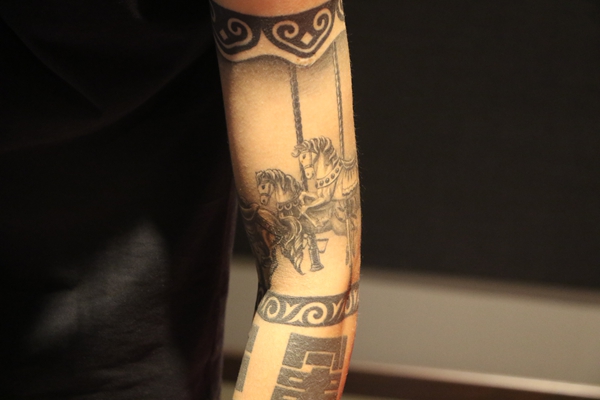Tattoos in Beijing
china.org.cn / chinagate.cn by Mariah Breeze, August 11, 2016 Adjust font size:
 |
|
Tattoo lover Ji Ri's tattoo of a merry-go-round surrounded by Mongolian style tents. [Photo by Li Xiaohua/China.org.cn] |
Ji Ri agrees that when it comes to tattoo quality, you get what you pay for. He has six tattoos, and said that he has spent around 1000 yuan (about US$151) an hour for some of his pieces. Depending on the shop, being a tattoo artist can prove to be a very lucrative business. Although it is an expensive hobby, he thinks he will continue getting tattoos as he gets older. "I can see myself getting a tattoo at the age of 65 if my body allows it." He got his first tattoo when he was 18, which he thinks is a good age for a person to get their first tattoo.
One of his most interesting pieces involves a Western-style merry-go-round and a traditional Mongolian tent. "This tattoo symbolizes the East meeting the West." Regarding westerners getting tattoos of Chinese characters and symbols, Ji said that he didn't like it. "I don't think it is proper for foreigners to get traditional Chinese tattoos, because it's like a foreign girl wearing a Chinese dress; it just doesn't look good."
Nie Chaoheng, owner of Hengci Tattoo Studio, says many foreigners come to the shop requesting Chinese designs for their tattoos. He has been a shop owner for nine years and now has one in Beijing and one in Shanghai. "The Beijing shop has been the most profitable and has been open longer than the one in Shanghai, which has only been open for three years now. His mentor, a famous tattoo artist in China, taught him step by step in a professional and authentic manner. "There are now a few commercial trading schools that teach the art of tattooing, but when I first started, these sort of programs didn't exist."
His first shop was 10 square meters and in a bad location. "It took me five years to relocate to the Hutong district, and I like this place more because I feel surrounded by traditional Chinese culture."
The current shop is very popular and is busy throughout the day. "My customers tend to be around 35-40. If they are too young, they can't afford me because I charge more than other artists. If they are too old, they might not trust me because of my youth." He has noticed a trend of clients requesting Japanese or other eastern-style tattoos. "Many Chinese people are influenced by their experiences and what they see, so when movie stars or TV personalities display a certain style, that's what they want."
Nie Chaoheng and both of the tattoo lovers agree that although their parents may not like tattoos, the art form is becoming more accepted in China.